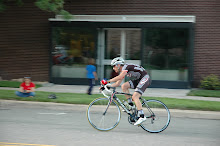Specificity is Key - 11/06/06
As many of you know, Lance Armstrong just completed the NYC marathon. There was probably more talk around Lance's time to finish than there was about either of the pro races. In a nutshell, Lance was shooting for a 2:45 finish time (just slower than 6:00 / mile pace). The pundits' predictions ranged from his being able to hit that time or even come closer to 2:30, to coming in at 3:00, 3:30 or DNF'ing. I personally thought he could hit 3:00 if everything went right for him, but that 3:15 was more realistic. I applaud him for just cracking the 3-hour mark.
However, his 3-hour performance also brings up some glaring insight. Lance's pedigree as a top athlete is long and extensive. He was a strong swimmer and runner in high school before taking up the bike and then trying his hand at triathlon. He was very strong on the bike and raced fairly well against the top pros. He then shifted over to cycling and the rest is history.
In retrospect, I am shocked to some degree at Lance's bold prediction of a 2:45 finish. A 3-week Tour is a different animal than a 3-hour marathon. Being in supreme shape does not make an elite athlete across the board. Beyond the physical changes Lance underwent by focusing on the bike for more than a decade that are prohibitive to top notch running, he also seems to have forgotten that after winning his last Tour, he went on a 3-mile run with Cheryl Crow and had trouble walking the next day. It would be no different than a top marathoner trying his or her hand at another sport and expecting relative high success. It's just not going to happen overnight.
Cross-training helps in several ways. Some examples are: 1) muscles are worked in a different way than in your primary sport, so added strength, flexibility and durability can be reached; 2) working out in any sport will help to further your fitness; 3) a break from your primary sport for a given period of time can certainly help keep your body and overall approach "fresh." There are plenty of other benefits. But, one detractor is this: time away from your primary sport keeps you from progressing in your primary sport as much as if you focused on it. If you cross-country ski in the winter and don't touch your bike you will certainly be in great shape when you blow the dust off your bike come March. However, you will be a few steps behind where you would be if you instead straddled the bike throughout the winter. Now, this is not to say that you can't or won't eventually "catch up" by the time you hit your key races. But, if you choose to cross-train, my suggestion
would be to "stay in touch" with your primary sport at least a couple days per week so that the transition back to full-time focus is easier.
To his credit, he did state that a marathon is the hardest thing he has ever done. Had he better prepared or prepared for longer than a handful of months, he probably could have hit that 2:45 mark and not been in so much pain & discomfort at the end. Lance will never be a world class marathoner. He won't even be an elite marathoner. It's no different that Mark Allen being able to run a sub-2:40 at the end of an Ironman but not being able to hold a sub-2:20 pace on fresh legs (after training specifically for a marathon for the better part of a year between his 5th and 6th Ironman World Champ titles).
While there is some overlap in terms of muscle groups used, planes of motion, duration, stresses, etc., each sport is truly unique. If your goal is to be the best (cyclist, triathlete, runner, kayaker, whatever), then my suggestion is to make sure you keep your primary sport as your primary focus year round. Not your only focus necessarily, but certainly your primary focus.
Happy Training,
Nate Llerandi

